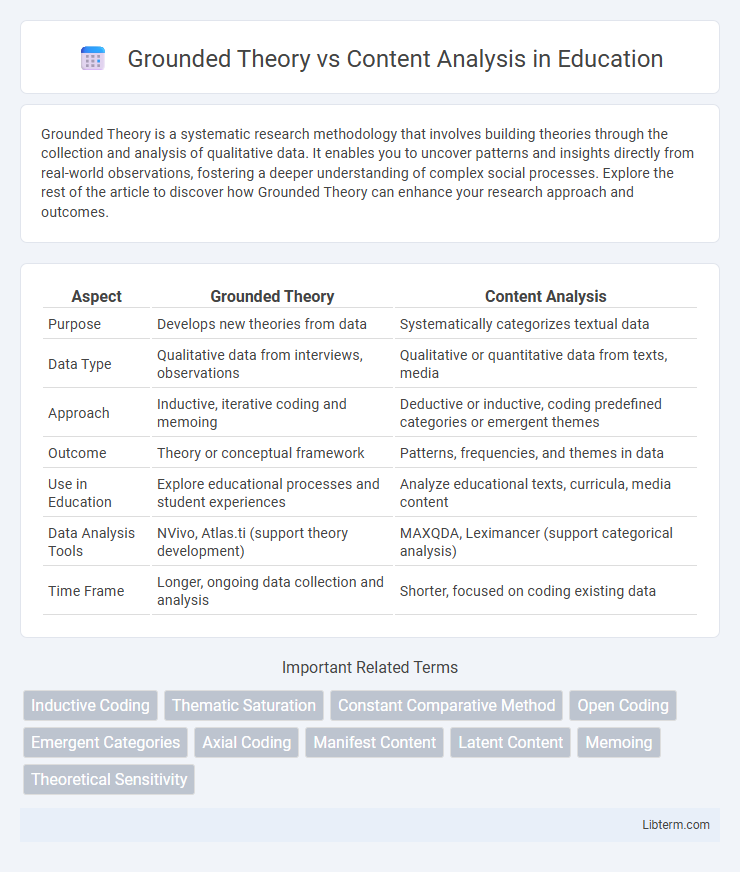Grounded Theory is a systematic research methodology that involves building theories through the collection and analysis of qualitative data. It enables you to uncover patterns and insights directly from real-world observations, fostering a deeper understanding of complex social processes. Explore the rest of the article to discover how Grounded Theory can enhance your research approach and outcomes.
Table of Comparison
| Aspect | Grounded Theory | Content Analysis |
|---|---|---|
| Purpose | Develops new theories from data | Systematically categorizes textual data |
| Data Type | Qualitative data from interviews, observations | Qualitative or quantitative data from texts, media |
| Approach | Inductive, iterative coding and memoing | Deductive or inductive, coding predefined categories or emergent themes |
| Outcome | Theory or conceptual framework | Patterns, frequencies, and themes in data |
| Use in Education | Explore educational processes and student experiences | Analyze educational texts, curricula, media content |
| Data Analysis Tools | NVivo, Atlas.ti (support theory development) | MAXQDA, Leximancer (support categorical analysis) |
| Time Frame | Longer, ongoing data collection and analysis | Shorter, focused on coding existing data |
Introduction to Grounded Theory and Content Analysis
Grounded Theory is a qualitative research methodology aimed at generating theory directly from data through systematic collection and analysis, emphasizing iterative coding and constant comparison. Content Analysis, on the other hand, is a research technique used to quantify and analyze the presence of certain words, themes, or concepts within qualitative data, enabling objective and replicable interpretation. Both methods serve distinct purposes: Grounded Theory focuses on theory development, while Content Analysis centers on identifying patterns and frequencies within textual information.
Historical Background and Development
Grounded Theory, developed by Barney Glaser and Anselm Strauss in the 1960s, emerged as a methodological innovation to generate theory directly from qualitative data. Content Analysis, with roots tracing back to early communication studies in the 1920s, evolved as a systematic approach to quantifying and interpreting textual information. Both methods reflect distinct historical trajectories responding to different research needs: Grounded Theory prioritizes theory generation while Content Analysis emphasizes categorization and frequency analysis.
Core Principles and Philosophical Foundations
Grounded Theory is rooted in constructivist philosophy, emphasizing theory generation through iterative data collection and constant comparative analysis to develop concepts grounded in empirical evidence. Content Analysis operates on a positivist foundation, systematically categorizing textual data to quantify themes and patterns, often prioritizing frequency and coding reliability. While Grounded Theory seeks to build explanatory models, Content Analysis primarily focuses on describing and interpreting the presence of specific content within texts.
Research Objectives and Applications
Grounded Theory aims to develop new theories by systematically gathering and analyzing qualitative data, making it ideal for exploratory research seeking to understand social processes and patterns. Content Analysis focuses on quantifying and interpreting the presence of certain words, themes, or concepts within textual data, commonly used in media studies, communication research, and trend analysis. Researchers choose Grounded Theory for generating theory grounded in data, while Content Analysis is preferred for studying frequency and contextual meaning across large datasets.
Data Collection Techniques
Grounded Theory employs iterative data collection techniques such as open-ended interviews and participant observations, allowing researchers to generate theories directly from the data through constant comparison. Content Analysis relies on systematic coding and categorization of textual or visual data obtained from documents, media, or recorded communication to identify patterns and themes. Grounded Theory's approach is flexible and emergent, while Content Analysis follows a more structured and predefined coding scheme for data extraction.
Data Coding and Analysis Processes
Grounded Theory involves iterative data coding through open, axial, and selective coding phases to develop a theoretical framework grounded in the data. Content Analysis systematically categorizes data into predefined codes or themes, emphasizing frequency and patterns for quantitative or qualitative interpretation. Both methods require rigorous data coding, but Grounded Theory prioritizes theory generation while Content Analysis focuses on summarizing and quantifying textual information.
Levels of Interpretation
Grounded Theory involves multiple levels of interpretation, starting with open coding to identify initial concepts, followed by axial coding to explore relationships, and selective coding to develop core categories, enabling theory generation. Content Analysis primarily focuses on a single level of interpretation by quantifying and categorizing textual data to identify patterns and frequency of themes, emphasizing a descriptive rather than theoretical outcome. The iterative, layered approach of Grounded Theory provides deeper conceptual insights compared to the more surface-level, systematic coding in Content Analysis.
Strengths and Limitations of Each Method
Grounded Theory excels in generating rich, theory-driven insights directly from qualitative data, making it ideal for exploring complex social processes, but it requires significant time investment and researcher expertise to avoid bias. Content Analysis offers quantitative rigor by systematically coding textual data for frequency and patterns, facilitating comparison across large datasets, yet it may oversimplify nuanced meanings and context. Both methods complement each other: Grounded Theory provides depth and conceptual development, while Content Analysis enhances replicability and statistical validation.
Common Challenges and Considerations
Grounded Theory and Content Analysis both face challenges related to data saturation, coding reliability, and researcher bias, which can affect the validity of findings. Grounded Theory requires iterative data collection and constant comparative methods, demanding significant time and analytical skills, while Content Analysis often grapples with subjectivity in theme identification and can be limited by predefined coding schemes. Researchers must consider the depth of theory development in Grounded Theory versus the quantification potential in Content Analysis to align methodological choices with research objectives.
Choosing Between Grounded Theory and Content Analysis
Choosing between Grounded Theory and Content Analysis depends on research goals and data complexity. Grounded Theory is ideal for generating new theories through systematic data coding and constant comparison, particularly useful in exploratory studies with qualitative data. Content Analysis suits studies aiming to quantify patterns within textual data, enabling statistical analysis and structured categorization of existing content.
Grounded Theory Infographic

 libterm.com
libterm.com